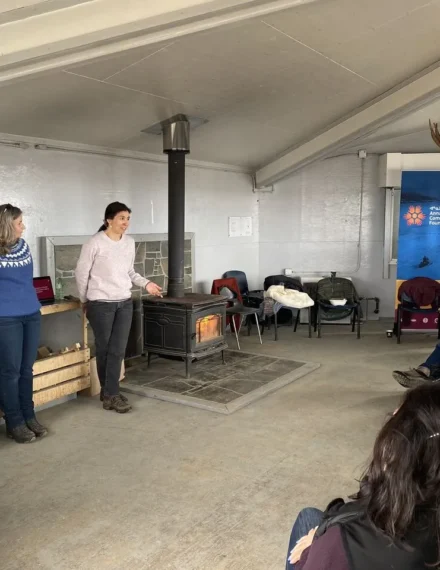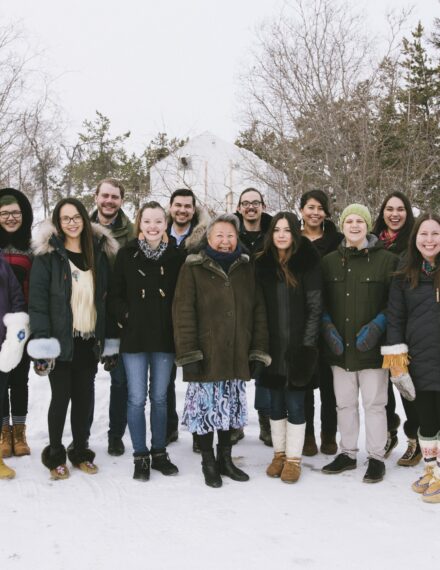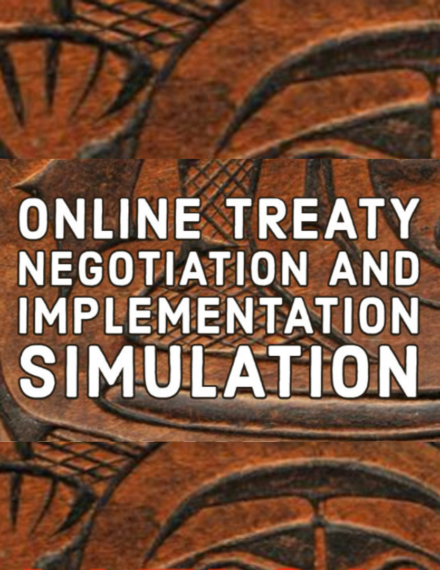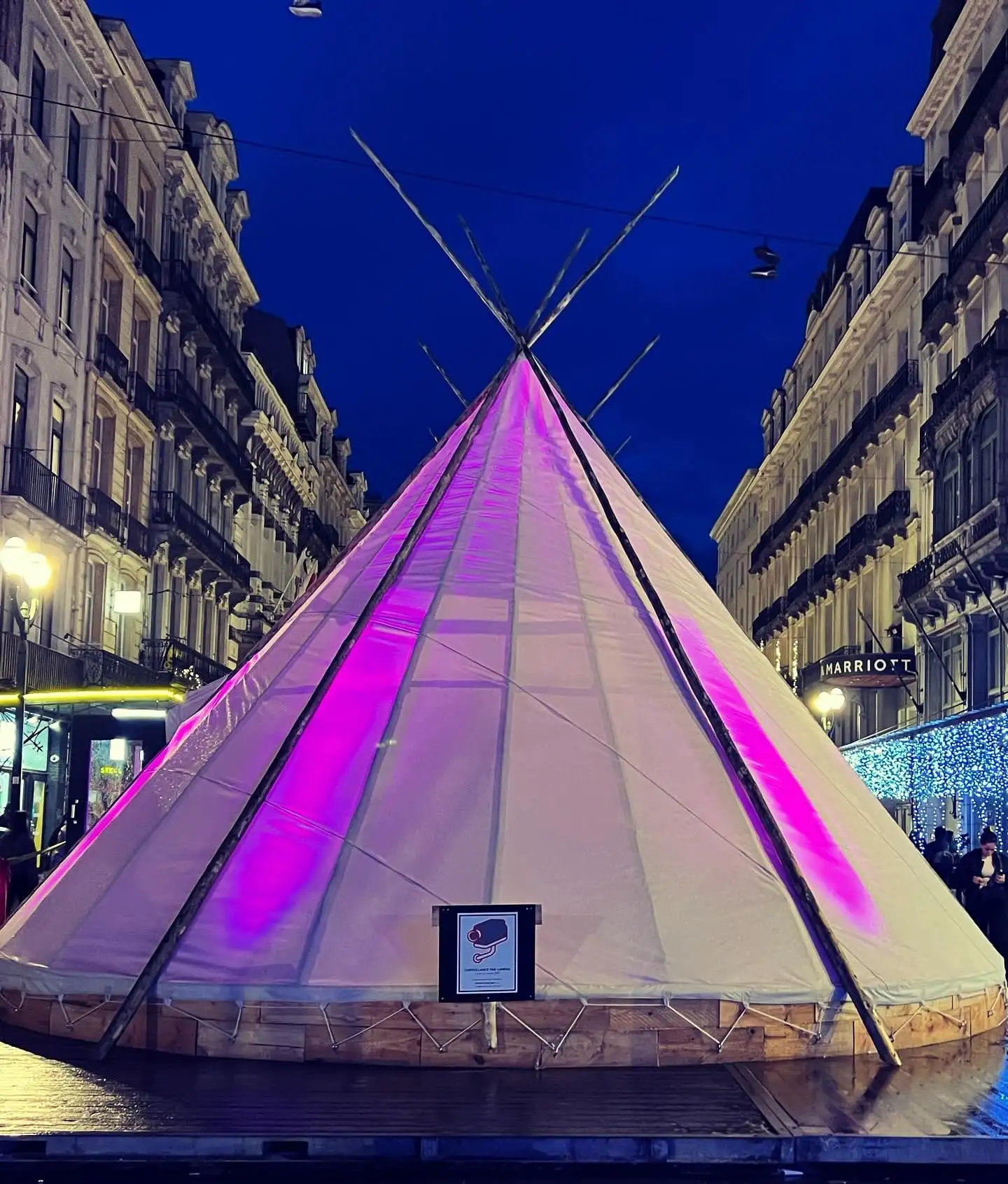
I’m flying over Greenland and the sun is setting on my eight-hour flight back to Canada, inspiring me to reflect on my past few days at the Arctic Futures Symposium in Brussels, Belgium.
Over a two-month time frame, I attended two international conferences. The most recent was in Belgium, prior to that there was the Arctic Circle Assembly and Arctic Policy Hackathon in Iceland. At the Hackathon, fifteen people from across the Arctic gathered to discuss pressing issues and help create policy recommendations focused on attracting and keeping people in the Arctic.
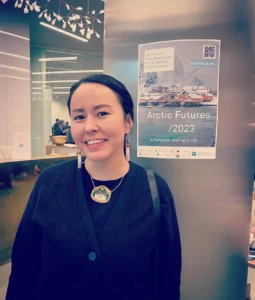
Kristen Tanche at the Arctic Futures Symposium, Brussels.
I bonded with fellow Indigenous peoples from across Canada and created new friends with people from Greenland, Sweden, Finland, Norway, Sampi, Iceland, the United States and Finland. I learned of the many commonalities, but also the differences, that we face.
Some of the differences I heard were that there are many European Arctic cities and countries that have access to health care, free quality education, and paved roads.
In the Dehcho (my home territory in Southern Northwest Territories), our healthcare system is often hard to access, we have to travel long distances to see specialists. We do not have post-secondary education systems that are accessible and free. We all have to pay large amounts to access Colleges and Universities in Canada, and there are no Universities in the Northwest Territories. We are losing people to mental health and addictions. Our region has been dealing with many issues related to drug and alcohol addictions and we have little access to consistent cultural healing programs. And we still do not have fully paved roads to our communities. Further impacting road access is climate change, our ice road isn’t freezing over when it normally does, and our ferry is shutting down due to low water levels.
While these are just some examples of how we differ, what I found to be the common story from Indigenous people from the United States, Canada and Greenland, is that often, our communities lack basic access to services.
I heard these stories again at the Arctic Futures Symposium, in Brussels, Belgium.
Before going to Belgium, I told my husband “I don’t know what I’m doing going … I’m presenting with diplomats, and people with PhDs. It isn’t where I belong. It’s not my expertise.”
I felt this way until the day of the Arctic Futures Symposium. I listened to people talk about geopolitics, and international issues, feeling lost in what people were talking about, and googling numerous things, like “what is geopolitics”.
I had spent that morning at the Canadian Mission with some of their staff and the Canadian Ambassador to Iceland. I asked a staff member, whom I was sitting with, a similar question.
“What do I have to add to this? I don’t have anything to say about geopolitics or NATO, my background is community-based and regional. I hardly ever work nationally in Canada, never mind internationally.”
He told me, I had a lot to add. Because the conversations we were listening to focused on international issues, and that they needed to hear from people like me. That I brought it back to the local, personal level.
This resonated with me. At both international conferences I attended there was a common theme of international countries, with large populations and very different realities, speaking about the Arctic and the North. What I often found lacking was local, community level and Indigenous voices. Voices that reminded people about why we are doing all this work. About our realities. Our communities.
I did the panel and felt like I reached some people. I focused my part of the panel on the hackathon, myself and my personal life, my work for Dehcho First Nations and my region, and my wishes for my nieces and nephews. I was able to share a bit about the Northwest Territories. Our forest fires. Our struggles with addictions, mental health and suicide, and that in many northern communities, we are just trying to keep our people alive.
Through these conferences, I am learning that the North and the Arctic are places that are increasingly gaining more international interest. As the world comes to research our lands, and then there is interest in resource extraction, climate change, and Arctic sovereignty.
Some are interested in becoming allies with Indigenous peoples, in helping us to make space for our voices, in walking with us.
This is why I’d go to another international conference.
It’s important to me to continue to share, learn and help to be a voice for issues in the North. To help voice the differences we face and share our commonalities. To help share northern-created solutions, like the hackathon recommendations that reflect the varied realities in the Arctic.
It is also through these forums that I have met other Indigenous and young people. Whom I have learned from and shared with. In a youth panel, Jackson Blackwell, a graduate student and advisor from Alaska in the United States, talked about how the reality of the North American Arctic is not what the populated European Arctic faces. That we simply do not have the same amount of people and our issues can often be focused on just having basic services. His example was the access to running water in rural Alaska. Then he brought it back to why this is important. We need services. He said “The North American Arctic is nothing without its people. Our most valuable resource is our people.”
Why is it important for Indigenous peoples to be in these international spaces?
There are not enough of us there, that’s why.
Both conferences I attended had an underrepresentation of Indigenous peoples.
I spoke my language in my introductions. To claim space. To say we are here. So that I can tell my nieces and nephews that Dene Zhatie has been spoken in Iceland and Belgium.
We live in the Arctic, we live in the North. We are the people that need to be at the forefront of any conversations about our homelands.
Kristen Tanche is Liidlii Kue First Nation, from the Dehcho region of the Northwest Territories. She currently works for Dehcho First Nations as the Regional Director of Health and Wellness.
Kristen took part in the second Arctic Policy Hackathon in October 2023. Kristen was also a 2018-19 Jane Glassco Northern Fellow. Her policy research paper was Ways forward in addictions programming in Fort Simpson Northwest Territories Dene Gogǫndıé Voices of the People.
Header photo: Brussels, Belgium. Credit: Kristen Tanche.
